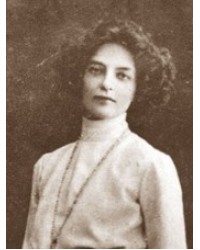Zinaida Gippius

Zinaida Nikolayevna Gippius (1869 –1945) was a Russian poet, playwright, novelist, editor and religious thinker, one of the major figures in Russian symbolism. The story of her marriage to Dmitry Merezhkovsky, which lasted 52 years, is described in her unfinished book Dmitry Merezhkovsky (Paris, 1951; Moscow, 1991).
She began writing at an early age, and by the time she met Dmitry Merezhkovsky in 1888, she was already a published poet. The two were married in 1889. Gippius published her first book of poetry, Collection of Poems. 1889–1903, in 1903, and her second collection, Collection of Poems. Book 2. 1903-1909, in 1910. After the 1905 Revolution, The Merezhkovskys became critics of Tsarism; they spent several years abroad during this time, including trips for treatment of health issues. They denounced the 1917 October Revolution, seeing it as a cultural disaster, and in 1919 emigrated to Poland.
Zinaida Gippius was born on 20 November 1869, in Belyov, Tula, the eldest of her four sisters. Her father, Nikolai Romanovich Gippius, a respected lawyer and a senior officer in the Russian Senate, was a German-Russian, whose ancestor Adolphus von Gingst, later von Hippius, came to settle in Moscow in the 16th century. Her mother Anastasia Vasilyevna (née Stepanova), was a daughter of the Yekaterinburg Chief of Police.
Nikolai Gippius's job entailed constant traveling, and because of this his daughters received little formal education. Taking lessons from governesses and visiting tutors, they attended schools sporadically in whatever city (Saratov, Tula and Kiev, among others) the family happened to stay for a significant period of time. At the age of 48 Nikolai Gippius died of tuberculosis, and Anastasia Vasilyevna, knowing that all of her girls had inherited a predisposition to the illness that killed him, moved the family southwards, first to Yalta (where Zinaida had medical treatment) then in 1885 to Tiflis, closer to their uncle Alexander Stepanov's home.
By this time, Zinaida had already studied for two years at a girls' school in Kiev (1877—1878) and for a year at the Moscow Fischer Gymnasium. It was only in Borzhomi where her uncle Alexander, a man of considerable means, rented a dacha for her, that she started to get back to normal after the profound shock caused by her beloved father's death.
Zinaida started writing poetry at the age of seven. By the time she met Dmitry Merezhkovsky in 1888, she was already a published poet. "By the year 1880 I was writing verses, being a great believer in 'inspiration', and making it a point never to take my pen away from paper. People around me saw these poems as a sign of my being 'spoiled', but I never tried to conceal them and, of course, I wasn't spoiled at all, what with my religious upbringing," she wrote in 1902 in a letter to Valery Bryusov. A good-looking girl, Zinaida attracted a lot of attention in Borzhomi, but Merezhkovsky, a well-educated introvert, impressed her first and foremost as a perfect kindred spirit. Once he proposed, she accepted him without hesitation, and never came to regret what might have seemed a hasty decision.
Gippius and Merezhkovsky were married on 8 January 1889, in Tiflis. They had a short honeymoon tour involving a stay in the Crimea, then returned to Saint Petersburg and moved into a flat in what was known then as the Muruzi House, which Merezhkovsky's mother had rented and furnished for them as a wedding gift.


